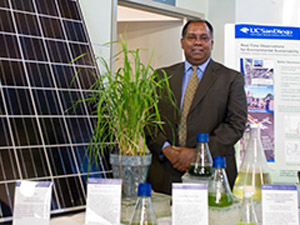Sustainability Solutions Institute Hosts UCSD Water Collaborative Kick-Off
By Tiffany Fox, (858) 246-0353, tfox@ucsd.edu
San Diego, Calif., Nov. 3, 2009 — Taking the University of California, San Diego, off the "water grid" is a daunting proposition. As one of the largest clients of the Metropolitan Water District of Southern California, UC San Diego consumes 800 million gallons of water annually and spends a whopping $6 million per year on water and sewage services.
|
But going "off-grid" is precisely the direction the university's Sustainability Solutions Institute (SSI) would like to take the campus. At the kick-off for SSI's UC San Diego Water Collaborative earlier this month, Director Paul Linden called the impending water shortage in California "a local problem with huge consequence for the globe." Reducing UCSD's dependence on imported water supplies, Linden said, would not only save the university money in the long run, it would also cement its status as a leader in sustainable solutions.
Hence the establishment of the Water Collaborative, a regional initiative to understand what it will take to achieve water sustainability. SSI, which is based at the UCSD division of the California Institute for Telecommunications and Information Technology (Calit2), is recruiting members of the campus community to conduct research and experimentation in an effort to stimulate, demonstrate and evaluate water conservation and re-use strategies. The initiative will include a conceptual study evaluating technologies and practices for readiness, cost and potential impact, as well as technical seminars and public outreach for innovators and practitioners to share ideas and engage with the broader community. The collaborative will incorporate a network of partners from water agencies, other universities, non-profit organizations and the business community.
"We have not only a moral commitment but also a financial commitment to see what we can do to reduce water consumption," said Gary Matthews, UCSD Vice Chancellor of Resource Management and Planning and a featured speaker at the kick-off event. "With 13 million square feet of facility space and up to 52,000 people on campus on any given day, UCSD represents a small city.
"We want to reduce consumption by 20 percent in the next five years," Matthews continued, "and to do that, we feel it's imperative to have common-sense leadership in the sustainability of UCSD's operations."
|
Mike Dettinger, a research hydrologist and climatologist with the Scripps Institution of Oceanography, noted in his kick-off presentation that San Diego — and the UCSD campus in particular — will face a number of water-related challenges in the near future. Eighty to 90 percent of California's water supply is already imported, he added, and water demand is expected to rise 30 percent by 2030. Meanwhile, climatologists predict significant declines in regional precipitation and a 20 percent reduction in the Colorado River's stream flow, which is a source of much of San Diego's water.
"By mid-century, San Diego will be contending with increased water demand, limits on local supplies and current Colorado river arrangements, as well as a decline in water imports," Dettinger said. "With these scenarios, there are gaps to be filled."
The campus, he suggested, can lead the region in exploring and developing new methods for demand management, re-use and possible desalination, which are "the only 'sources' of water in our hands," he added. "We need to learn how to exploit them to the fullest."
Matthews noted that UCSD — which includes water conservation in its master plan — has already taken a number of steps to reduce water consumption, including reclaiming water for irrigation, planting native vegetation that requires less moisture and installing water efficiency fixtures, including roughly 4,000 efficiency sprinkler heads that were installed in the last year (the nozzles use 30 percent less water). In addition, the campus has limited the use of fountains, restricted vehicle and equipment washing and committed to repairing any water leaks within 24 hours.
|
UCSD leadership, which predicts $1 billion of new campus construction every five years, is also working toward designing all campus buildings to meet the "silver" standards of the Leadership in Energy and Environmental Design (LEED) Green Building Rating System. The campus also has plans in place to become a global demonstration project for sea water cooling, which, according to Matthews, could save $4 million in energy and 100 million gallons of water per year.
"We also want to create viable infrastructure for storm water treatment and increase awareness of watershed connection to the ocean," he noted. "Groundwater runoff is an issue for us, being so close to the coast."
The next steps for the Collaborative will be to encourage faculty to register interest in research areas, to designate team leaders to coordinate initial meetings and to secure funding through seed grants and other sources secured through SSI.
Added Linden: "If we're going to teach or preach about sustainability, we certainly need to practice it. This Water Collaborative presents several research opportunities in technology, behavioral/health modification and economics. I think it's a fascinating challenge to figure out how to do this. If we're going to take this forward, we really need the help of the entire campus community."
The Collaborative hosts a Technical Seminar Series open to members of the UCSD community including UCSD faculty, students and staff in Calit2's Atkinson Hall, Room 4004. Its next technical seminar will be at 4 p.m. Wednesday, Nov. 18, featuring Michael Motherway of DXV Water Technologies.
For more information, contact SSI Project Manager Kim McIntyre, kmcintyre@ucsd.edu or (858) 822-1483.
Media Contacts
Tiffany Fox, (858) 246-0353, tfox@ucsd.edu
Related Links




